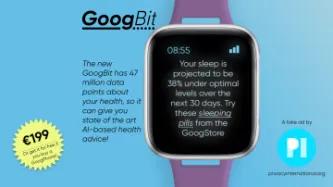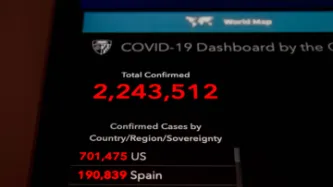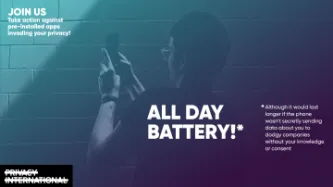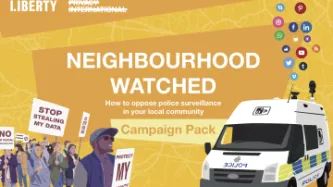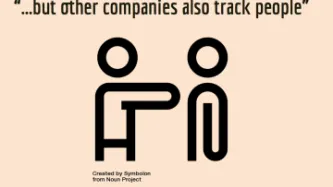Advanced Search
Content Type: Long Read
Social media is now undeniably a significant part of many of our lives, in the UK and around the world. We use it to connect with others and share information in public and private ways. Governments and companies have, of course, taken note and built fortunes or extended their power by exploiting the digital information we generate. But should the power to use the information we share online be unlimited, especially for governments who increasingly use that information to make material…
Content Type: News & Analysis
Today Apple announced a set of measures aimed at improving child safety in the USA. While well-intentioned, their plans risk opening the door to mass surveillance around the world while arguably doing little to improve child safety.
Among the measures, Apple has announced that it is to introduce “on-device machine learning” which would analyse attachments for sexually explicit material, send a warning, and begin scanning every photo stored on its customers’ iCloud in order to detect child…
Content Type: News & Analysis
It is difficult to imagine a more intrusive invasion of privacy than the search of a personal or home computer ... when connected to the internet, computers serve as portals to an almost infinite amount of information that is shared between different users and is stored almost anywhere in the world.
R v Vu 2013 SCC 60, [2013] 3 SCR 657 at [40] and [41].
The controversial Police Crime Sentencing and Courts Bill includes provision for extracting data from electronic devices.
The Bill…
Content Type: News & Analysis
The Aspen Card - the debit payment card given to asylum seekers that PI has previously exposed as a de facto surveillance tool - will be outsourced to a new company. The contract with Sodexo has come to an end and the company Prepaid Financial Services will be taking over.
Our campaign for transparency in relation to the Aspen Card and how it monitors asylum seekers continues. Not only do we demand clarity from the Home Office [read more here], we believe the new provider, Prepaid Financial…
Content Type: News & Analysis
Earlier this week, the UK Government announced that no immigration status checks will be carried out for migrants trying to register with their GP and get vaccinated. But temporary offers of safety are not enough to undo the decades of harm caused by policies that have embedded immigration controls into public services.
Years of charging migrants for healthcare and sharing patient data with the Home Office has eroded trust between migrant communities and the NHS. As a result, they might not…
Content Type: Long Read
As we see Covid-19 vaccination programmes beginning around the world, for the first time since the start of the pandemic there seems to be a light at the end of the tunnel as the fruition of truly unrivalled global scientific efforts has given us hope of saving lives, reopening our societies, and going back to “normal”.
This great moment of hope must not be seen opportunistically as yet another data grab. The deployment of vaccines, and in particular any “immunity passport” or certificate…
Content Type: News & Analysis
Le « Fonds fiduciaire d’urgence de l’Union européenne en faveur de la stabilité et de la lutte contre les causes profondes de la migration irrégulière et du phénomène des personnes déplacées en Afrique » (le « fonds fiduciaire pour l’Afrique ») ne fait pas les grands titres (et il est plutôt difficile à retenir), mais son influence est vaste et aura des conséquences pendant plusieurs décennies sur la vie de millions de personnes sur le continent africain.
Mis en place suite à la « crise…
Content Type: News & Analysis
The “EU Trust Fund for Stability and Addressing Root Causes of Irregular Migration and Displaced Persons in Africa” (EUTF for Africa) isn’t exactly headline news (and nor does it exactly roll off the tongue), but its influence is vast and will be felt for decades to come for millions of people across Africa.
Set up in the wake of the 2015 ‘migration crisis’ in Europe and largely made up of money earmarked for development aid (80% of its budget comes from development and humanitarian aid funds…
Content Type: News & Analysis
The Law Enforcement Data Service (LEDS) is a unified, common interface to a new mega-database currently being developed by the Home Office National Law Enforcement Data Programme (NLEDP). We believe that the development of the programme poses a threat to privacy and other rights and must be subjected to strong oversight, safeguards, and transparency measures.
As we explained in our analysis, the data in LEDS is vast, ever-increasing, worryingly mixes both evidential and intelligence material –…
Content Type: News & Analysis
In the last few weeks, the UK government has announced various new measures to ensure that crossings across the Channel were “inviable” including by appointing a new role of “clandestine Channel threat commander" and further plans to deploy the navy to stop migrants from crossing to the UK from France across the Channel. Premature plans it seems, as not only would such measures be contrary to the UK’s international obligations to allow individuals to seek asylum in the UK, but also since such…
Content Type: News & Analysis
Banning TikTok? It's time to fix the out-of-control data exploitation industry - not a symptom of it
Chinese apps and tech companies have been at the forefront of the news recently. Following India's ban of 59 chinese apps in July, President Trump announced his desire to ban TikTok, shortly followed by his backing of Microsoft's intention to buy the US branch of its parent company ByteDance. Other than others lip syncing his public declaration, what does President Trump fear from this app, run by a firm, based in China?
It's all about that data
One clear answer emerges: the exploitation of…
Content Type: News & Analysis
The UN Special Rapporteur on the promotion and protection of human rights and fundamental freedoms while countering terrorism, Professor Fionnuala Ní Aoláin together with Dr. Krisztina Huszti-Orbán, released today a key report on the “Use of Biometric Data to Identify Terrorists: Best Practice or Risky Business?”.
The report explores the human rights risks involved in the deployment of biometrics emphasising that
in the absence of robust rights protections which are institutionally embedded…
Content Type: Long Read
What Do We Know?
Palantir & the NHS
What You Don’t Know About Palantir in the UK
Steps We’re Taking
The Way Forward
This article was written by No Tech For Tyrants - an organisation that works on severing links between higher education, violent tech & hostile immigration environments.
Content Type: News & Analysis
Name: Google/Fitbit mergerAge: GestatingAppearance: A bit dodgy. One of the world’s biggest tech giants, trying to purchase a company that makes fitness tracking devices, and therefore has huge amounts of our health data.I don’t get it. Basically Google is trying to buy Fitbit. As if Google doesn’t already have enough data about us, it now wants huge amounts of health data too.Oh, Fitbit, that’s that weird little watch-type-thing that people get for Christmas, wear for about a month while they…
Content Type: Press release
Today, the ICO has issued a long-awaited and critical report on Police practices regarding extraction of data from people's phones, including phones belonging to the victims of crime.
The report highlights numerous risks and failures by the police in terms of data protection and privacy rights. The report comes as a result of PI’s complaint, dating back to 2018, where we outlined our concerns about this intrusive practice, which involves extraction of data from devices of victims, witnesses…
Content Type: Long Read
There are few places in the world where an individual is as vulnerable as at the border of a foreign country.As migration continues to be high on the social and political agenda, Western countries are increasingly adopting an approach that criminalises people at the border. Asylum seekers are often targeted with intrusive surveillance technologies and afforded only limited rights (including in relation to data protection), often having the effect of being treated as “guilty until proven…
Content Type: Press release
On 15 June 2020, Google formally notified the European Commission of its proposed acquisition of Fitbit, enabling them to capture a massive trove of sensitive health data that will expand and entrench its digital dominance. Privacy International is calling on EU regulators to block the merger.
In November 2019, Google announced its plan to acquire Fitbit, a company that produces and sells health tracking technologies and wearables - including smartwatches, health trackers and smart scales -…
Content Type: Long Read
Today, migrant communities in the UK already face multiple well-documented obstacles in accessing healthcare, not least because of charges to access the National Health Service (NHS), as it is the case for non-EU migrants, and legitimate fears of data-sharing between the NHS and the Home Office.
In the current pandemic, in addition to these concerns, asylum-seekers face an impossible choice: risk exposure to coronavirus, or be unable to apply for asylum.
Individuals seeking…
Content Type: News & Analysis
Political campaigns around the world have turned into sophisticated data operations. They rely on data- your data- to facilitate a number of decisions: where to hold rallies, which States or constituencies to focus resources on, which campaign messages to focus on in which area, and how to target supporters, undecided voters, and non-supporters.
While data driven political campaigns are not new, the granularity of data available and the potential power to sway or suppress voters through that…
Content Type: Long Read
On 15th April Margaret Atwood, author of the Handmaid's Tale, gave an interview to BBC Radio 5 Live where she commented that ‘people may be making arrangements that aren’t too pleasant, but it’s not a deliberate totalitarianism’. You can read more about the interview in the Guardian.
While we agree with Margaret Atwood that we are not necessarily entering an era of "deliberate totalitarianism" we have written the following open letter (download link at the bottom of the page) to her as a ‘…
Content Type: News & Analysis
Lockdowns and quarantines are an extraordinary measure that help in slowing down the global COVID-19 pandemic, and protecting the population.
However, they come at an even higher cost to some individuals, such as victims of domestic violence, persons in a vulnerable situation, and human rights defenders, who face specific threats that are exacerbated by measures taken by governments to address the global pandemic.
In that context, states should adopt special measures to keep those people…
Content Type: News & Analysis
Privacy shouldn’t be a luxury.
Google claim to agree with us - we know that because Sundar Pichai, their CEO, said so this May in the New York Times. And yet, Google are enabling an ecosystem that exploits people who own low-cost phones.
Today we, along with over 50 organisations including Amnesty International, DuckDuckGo, and the ACLU are asking Google to step up, and we’re asking you to join us in pressuring them to do the right thing.
Sign the petition
Google has the power to…
Content Type: Press release
A large number of apps on smart phones store data in the cloud. Law enforcement can access these vast troves of data from devices and from popular apps with the push of a button using cloud extraction technology.
Mobile phones remain the most frequently used and most important digital source for law enforcement investigations. Yet it is not just what is physically stored on the phone that law enforcement are after, but what can be accessed from it, primarily data stored in the Cloud.…
Content Type: Long Read
In December 2018, Privacy international exposed the dubious practices of some of the most popular apps in the world.Out of the 36 apps we tested, we found that 61% automatically transfer data to Facebook the moment a user opens the app. This happens whether the user has a Facebook account or not, and whether they are logged into Facebook or not. We also found that some of those apps routinely send Facebook incredibly detailed and sometimes sensitive personal data. Again, it didn’t matter if…
Content Type: Long Read
Six years after NSA contractor Edward Snowden leaked documents providing details about how states' mass surveillance programmes function, two states – the UK and South Africa – publicly admit using bulk interception capabilities.Both governments have been conducting bulk interception of internet traffic by tapping undersea fibre optic cables landing in the UK and South Africa respectively in secret for years.Both admissions came during and as a result of legal proceedings brought by Privacy…
Content Type: News & Analysis
While people may think that providing their photos and data is a small price to pay for the entertainment FaceApp offers, the app raises concerns about privacy, manipulation, and data exploitation—although these concerns are not necessarily unique to FaceApp.According to FaceApp's terms of use and privacy policy, people are giving FaceApp "a perpetual, irrevocable, nonexclusive, royalty-free, worldwide, fully-paid, transferable sub-licensable license" to use or publish the…
Content Type: Long Read
Join our campaign with Liberty and write to your local Police and Crime Commissioner (PCC). Your PCC works on your behalf to hold your local police force to account, so you can share your concerns about police spying tech with them.You can download our new campaign pack (pdf link at the bottom of the page) to learn more about the police surveillance technology that might already be being used in your local area, and find out what you can do to get your police force to be more accountable to you…
Content Type: Long Read
IMAGE SOURCE: "My Phone Bought This" by oliver t is licensed under CC BY-NC-ND 4.0.
LAST UPDATE: 16th May 2022.
Mandatory SIM card registration laws require people to provide personal information, including a valid ID or even their biometrics, as a condition for purchasing or activating a SIM card. Such a requirement allows the state to identify the owner of a SIM card and infer who is most likely making a call or sending a message at any given time.
SIM card…
Content Type: Long Read
When you go abroad, you expect to show your passport right? But what if immigration authorities wanted access to your Facebook, Instagram and Twitter accounts before they let you enter a country? What if they wanted to vet you based on your updates, photos, likes, retweets and even your DMs?We think social media companies, who make literally billions of dollars out of you, and wield massive power and influence, should challenge governments on YOUR behalf. They should be protecting their users…
Content Type: News & Analysis
In December 2018, we revealed how some of the most widely used apps in the Google Play Store automatically send personal data to Facebook the moment they are launched. That happens even if you don't have a Facebook account or are logged out of the Facebook platform (watch our talk at the Chaos Communication Congress (CCC) in Leipzig or read our full legal analysis here).Today, we have some good news for you: we retested all the apps from our report and it seems as if we…















